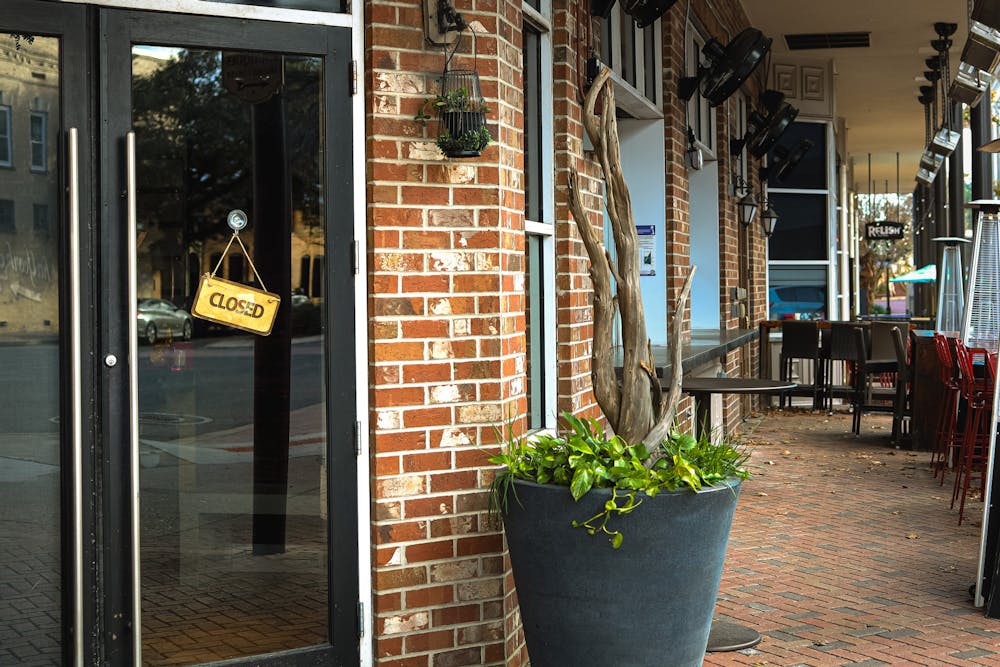The return of students to campus following nearly a month of winter break couldn’t come any sooner for one group of Gainesville residents: small business owners.
Every year, local businesses brace for a mass exodus of students leaving the area and face challenges with reduced revenue, short staffing and a lack of customers. These considerations are substantial barriers to shops that can’t quickly shift their strategy to serve local customers rather than students.
The Alachua County Economic Performance Index, collected from the National Economic Resilience Data Explorer, shows that county-wide gross domestic product, a measure including consumer spending, takes a noticeable dip during December. GDP also begins declining in May, before summer break, with a booming recovery in September, shortly after students return for the Fall semester.
For some owners, this harsh reality is just the cost of doing business in a college town.
Jeremiah Loper, founder and CEO of campus food delivery service 352 Delivery, has experienced the winter downturn for 11 years. Loper noted students who stay in Gainesville for summer classes continue to power the local economy, while nearly everyone leaves for the winter. This time around, his revenue was cut in half.
“Winter break is by far worse for local restaurants and businesses than any other break during the year,” Loper said. “It's much longer and it's much more intense too.”
As a food delivery service, Loper’s entire operation revolves around partner restaurants remaining open for business. But the best coping mechanism for some restaurants is to shut down completely and save on labor costs, dragging down Loper’s business in the process.
Loper said instead of having 80 restaurants in his service’s inventory, he’s had only 45 or 50 open and available during the break.
“It's pretty drastic,” he said.
Employees who remain in Gainesville throughout winter break also might reluctantly see their hours cut or face a temporary layoff from the slowdown, Loper said.
“A lot of the local drivers want to keep working,” Loper said. “And when you have half the amount of sales, that's half the amount of orders that can go to them, half the amount of delivery fees they make, and tips and things.”
Brian Gendreau, a clinical professor of finance at UF’s Warrington College of Business, said some businesses adapt to survive by reducing the amount of seating or servers they have. For others, downright closure is the best option.
“It really has a bigger impact on those businesses that rely very heavily on student traffic,” he said.
It isn’t just reduced traffic that small businesses must contend with, but a loss of employees. Gendreau said the same students who fuel the local economy with their spending also make up much of the workforce needed to keep those establishments running.
“A lot of the employees are students, and a lot of them probably want to be gone for the holidays. Supply and demand considerations are going on here,” Gendreau said.
Not all shops are equally affected. Gina Marks, the events and community relations manager at The Lynx Books in Gainesville, said the bookstore was an unusual example of one that fares better than most during the break. Marks said the break is also an opportunity for owners and operators to recharge, much like students do during the winter holidays.
“Our biggest season of the year is the lead up into Christmastime because Christmas is when everybody wants to buy books for everybody,” she said. “I was a little surprised that we weren't affected more.”
Contact Daniel Bednar at dbednar@alligator.org. Follow him on X @Danielbednar5.
Daniel Bednar is the City & County Commission reporter and a second-year political science major. He previously worked as the crime reporter. When he's not writing, you can find him driving a motorcycle or flying an airplane.






